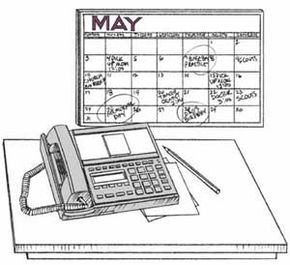Chasing papers wastes time and energy. And when bills aren't paid or permission slips aren't turned in, the price for disorganization is paid in late fees and lost field trips. In this article, we'll examine some strategies for cutting through the clutter. So if your idea of organizing your papers is stacking them on the dining room table, try some of the following hints:
- Designate one area of your home, even if it's only one drawer, for filing business papers, bills, letters, and clippings.
- Set up a filing system for your important papers and receipts. This can be as simple as an accordion file or a file cabinet that can do double duty as an end table.
- Use a "Miscellaneous" file for items that don't easily fit into a category, but be sure to go through this file when it fills up. You'll find that new categories will stand out, and unneeded items will be easily recognizable.
- Keep your mail in one location in the house, and open up and file everything at least once a week. If you can't file papers on a regular basis, use a folder labeled "To File" to temporarily store items. Be sure to set aside time to file these items.
- Hang a basket near the front door and keep your keys in it, so you'll always know where they are. Also use this basket for bills and letters that need to be mailed. When you grab your keys, you'll remember the mail.
- For households with children, keep a special clipboard in a prominent place for all those permission slips and other school documents that are easily mislaid.
- Instead of using an address book, try using index cards stored in a file box. Along with names, addresses, and phone numbers, you'll have room to keep track of birthdays, anniversaries, and even presents you've given in recent years. If someone moves, substitute an updated card.
- Review your filing system periodically and toss out items you no longer need, such as last year's utility bills or warranties on discarded items. Not all household papers need to be filed away. In the next section, we will learn about some household papers for everyday use.
Advertisement

